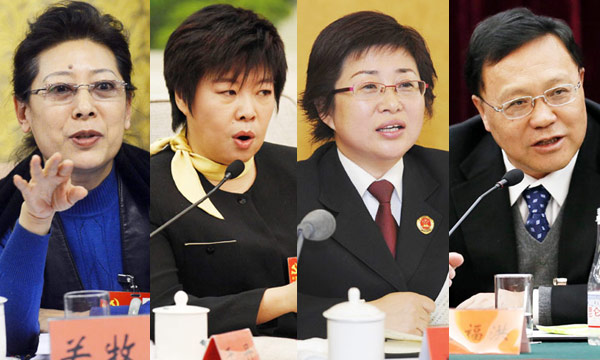Foreign officials say China's socialist road significant
(Xinhua)
Updated: 2012-11-12 00:06
BEIJING - As the 18th National Congress of the Communist Party of China (CPC) is underway, overseas officials, experts and media believed China's steadfast adherence to socialism with Chinese characteristics is rather significant to its future development, and to world peace and development as well.
Inacio Arruda, a senator and member of the Brazilian Communist Party, told Xinhua in a telephone interview that according to the keynote report given by General Secretary Hu Jintao, China will stick firmly to socialism with Chinese characteristics, which is not only of great significance to the Chinese economic and social development, but will also encourage Communist Party members worldwide.
China has now become Asia's newly-emerging giant, and the second largest economy in the world. China's rise is rooted in its adherence to the socialist road and the CPC's leadership, he said.
He added that there is no one and only mode to follow in practising socialism. The CPC has chosen a unique road based on China's national conditions, and has made tremendous achievements.
Hanin Nimr, general secretary of the Syrian Communist Party (Faisal) told Xinhua in an exclusive interview that China's experience in socialism-building is historic and worth learning.
He said China's experience has demonstrated the advantages of socialism. China's socialist system has solved the problem of feeding its people, and promoted China's continuous development.
Narayan Kaji Shrestha, deputy prime minister of Nepal, said China's emergence as the world's major economic and political power is impossible without the CPC's leadership.
He added that the reason why the CPC could accomplish so much is that it can combine the basic principles of Marxism-Leninism with the specific practice in China to suit the country's conditions.
Francois Ngarambe, secretary general of the Rwandan Patriotic Front, said over the past 10 years, China, under the CPC's leadership, has made huge accomplishment in building socialism with Chinese characteristics, and has accumulated a lot of experience, from which African nations, including Rwanda, could learn.
Sergey Luzyanin, a China expert with the Far Eastern Branch of the Russian Academy of Sciences, said China's 30 years of reform and opening-up has breathed new life into the country.
He also said the key achievement during these three decades is that China has found a development path that fits its own conditions. With its rising overall strength, China has gradually become the world's major player, and its surpassing Japan to become the world's second biggest economy is the most important proof of that.
Pierre Picard, a French China expert, said China's reform and opening-up policy is compatible with its own economic and cultural development.
He also said that more time should be given to the Chinese government to solve the problems as it carries out the reforms. The past 10 years have seen fundamental progress in China's economy, people's livelihood, urbanization, and global influence.
He added that China is also making efforts to implement political reforms.
Ibrahim Yusuf, chairman of the executive board of Indonesia's Council on World Affairs, told Xinhua that over the past 30 years, China's reform and opening-up policy has inspired Asia's economic growth, while its practice of maintaining political stability has promoted development in Asia.
Hartind Asrin, advisor to the Indonesian defense minister, said since China began to implement reform and opening-up policy back in the 1980s, China has maintained robust economic growth.
He also said the Chinese leaders have now shifted their attention to working out how to maintain sustainable growth and promote people's living standards.
Mohamad A.El-Saket, former Arab League ambassador, told Xinhua that the achievement China has made is attributed to the CPC's flexibility in adjusting its policies.
Under the guidance of the reform and opening-up policy, the CPC has made a success, and turned China into a global power with both regional and international influence, as well as a key global economy.
An editorial published by Malaysia's Sin Chew Daily said over the next 10 years and under the new leadership, China will complete the project of building a well-off society, and realize the goal of doubling its GDP and average per capita income for both urban and rural residents on the levels of 2010.
The Chinese government will give Chinese people access to greater democratic rights, comprehensively improve the people's livelihood, promote the country's soft power, and build a resource-conserving and environment-friendly society, said the editorial.
Related Stories
CPC Q&A: What is symbol of CPC? 2012-11-11 10:51
Foreign politicians, parties, organizations congratulate CPC on national congress 2012-11-11 13:43
World party leaders congratulate China on CPC congress 2012-11-11 11:24
CPC delegates' aspirations at a glance 2012-11-11 10:46
CPC Q&A: What are the strategic objectives of the Party? 2012-11-11 10:46
Election methods of CPC Congress approved 2012-11-11 07:32

Top News
A new generation of leaders
Xi's address to the media
World welcomes China's leadership change
Video







